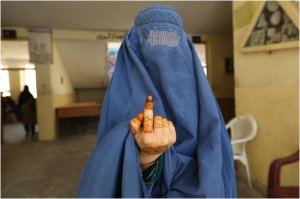
Gul Meena, a 63-year-old Pashtun woman from the hilly Dir Colony in the North Nazimabad area of Karachi, has not been to a polling station her entire life. She was surprised to hear on TV that some women from her hometown in Lower Dir went to Peshawar High Court when they were not allowed to vote in a recent by-election.
On May 18, women from the PK-95 constituency of the provincial assembly went to the PHC against the May 7 by-election in Lower Dir in which the contesting candidates had made a verbal agreement that women would not be allowed to go to the polling stations. A Jamaat-e-Islami candidate won the polls.
On June 2, the Election Commission of Pakistan canceled the result. “The by-election of Constituency No PK-95 Lower Dir-II is hereby declared void for the reasons of disenfranchisement of female voters,” said a notice released on Tuesday.
But in Karachi, Gul Meena and many other Pashtun women continue to be denied their right to vote. As many as 47,282 women had voted in the general elections in the same Lower Dir constituency in 2013. That amounts to about 37 percent of the total votes – almost the same ratio as that in PS-93, a Pashtun-dominated constituency in Karachi’s west district, if not better (an election tribunal found 6,000 bogus votes polled at only six of the 88 polling stations in the ultra-conservative Banaras locality). The percentage of women voters in Pashtun-dominated areas of Karachi (such as PS-89 Keamari, PS-94 Baldia, and PS-128 Landhi industrial area) is very low compared with other constituencies in the city.
10 percent of Pashtun women in Karachi do not even have a CNIC
Back in Khyber Pakhtunkhwa, neither the religious Jamaat-e-Islami nor the liberal Awami National Party made an effort to resist the disenfranchisement of women. JI emir Sirajul Haq blamed the practice on culture.
The same ‘cultural legacy’ is the reason behind low percentage of women voters in Pashtun areas of Karachi, analysts say.
“It happens in localities and communities inhabited by people who belong to the areas where they do not let women vote. It is reflective of those cultures and traditions. In other areas, women turn out in full force,” says Afia Salam, a Karachi-based journalist who covers gender issues.
Hamidullah Khattak, the information secretary of ANP in Sindh, blames lack of education, especially among women, that keeps them unaware of their of their rights. Karachi’s Pashtuns will hardly see any progress without active participation of women in electoral politics, he says.
Most Pashtuns in Karachi are poor laborers, says Nazir Jan, a central leader of Pakhtunkhwa Mili Awami Party (PMAP). “They need proper guidance, but the religious and nationalist parties who claim to represent them have never bothered to address this issue.”
Abdul Razaq – the head of Jamaat-e-Islami’s Pashtun Jirga and its emir in west district – believes Pashtun women would be encouraged to exercise their right to vote if they were given an electoral environment that was in accordance with their culture. “In the last general elections, we asked the Election Commission to convert more than five percent of the combined polling stations to women-only polling stations, for a better female turnout,” he said. “But our request was ignored.”
But low female turnout is not the issue, according to Nazir Jan. “The number of women registered as voters is equally low.” According to Abdul Razaq, a two-time Union Council Nazim from the Pashtun-dominated SITE area, more than 10 percent of women don’t even have Computerized National Identity Cards because of reasons deep rooted in their culture. “They cannot establish a family tree,” he said. “When a woman does not have an identity card, her daughter cannot have one either.”
In Dir and the rest of Khyber Pakhtunkhwa, women often vote for the candidate their families vote for, and therefore their disenfranchisement with the mutual consensus of all contenders doesn’t turn into a political disadvantage for either, says Mudassar Rizvi, chief of the Free and Fair Election Network (FAFEN).
The case is exactly the opposite in Karachi, experts say. To bar women from voting or not encouraging them to come out on the polling day deprives the concerned community of sizable votes.
“In an urban setup like Karachi, where women’s participation or absence from the electoral process directly impacts the overall results for the ethnic community, women become very important,” says Dr Fouzia Khan, a Pashtun social right activist. “In Karachi, all political parties claiming to represent Pashtuns, should realize the power of women voters.”
Hamidullah Khattak says his party, the ANP, discusses the issue in the regular meetings of its Sindh Council, which also has a woman member – Kamila Arif Khan, the party’s central vice-president on Sindh quota. “But it takes time for people’s ways to change.”
The less popular PMAP is seems to have done more work in this regard. “For the next voter registration, we have planned to run a drive to convince Pashtuns to get their wives, daughters and sisters registered, so that their voice can be heard in Sindh’s provincial legislature,” said Nazir Jan. “Without bringing women into the mainstream, the Pashtuns of Karachi – on its way to becoming the largest ethnic community in the city in two decades – cannot progress.”
The story was published in 5th June issue of TFT